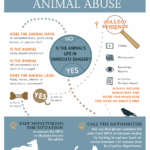Across the United States, the somber reality of animal cruelty often raises challenging questions and ignites fervent debates among advocates and lawmakers. Mississippi is no exception to this reality. The legal landscape surrounding animal cruelty varies significantly from state to state, affecting how charges are formulated and enforced. One pressing inquiry resonates among concerned citizens: what charges may arise in instances of animal mistreatment, and how do these compare across different states?
In Mississippi, the law addresses various forms of animal cruelty under Section 97-41-1 of the Mississippi Code. This statute delineates between different severity levels of animal abuse and offers a framework through which offenders may face prosecution. Basic violations can result in misdemeanors, but aggravated offenses leading to severe distress or death of an animal may incur felony charges. The nuances and potential penalties can have profound implications for both the animals involved and the perpetrators.
To delve deeper into this complex matter, it is essential to first understand the different forms of animal cruelty outlined in Mississippi law. The legislation categorizes offenses that include neglect, abandonment, and active abuse. Neglect often encompasses the failure to provide adequate food, water, shelter, or veterinary care. It poses a significant challenge as it may not always manifest clearly; animals may suffer silently without visible signs of trauma. Conversely, acts of aggression, such as physical abuse, are generally more apparent and draw immediate public outrage.
Penalties for animal cruelty in Mississippi can vary greatly. A first-time offender charged with a misdemeanor may face up to six months in jail and a potential fine of $1,000. If convicted of a felony involving aggravated cruelty, offenders may confront up to three years in prison and fines that can reach $5,000. Such repercussions reflect the state’s commitment to protecting animal welfare, yet they also highlight a critical inconsistency in how these laws are applied and enforced.
While Mississippi’s laws provide a framework, the challenge lies in the enforcement. Adequate resources and training for law enforcement personnel and animal control officers are crucial in cultivating a proactive approach to animal welfare. Moreover, the community’s awareness and involvement play a pivotal role in addressing and reporting suspected cruelty cases. Public advocacy for stronger legislation and increased funding for animal welfare organizations can also contribute to mitigating this societal issue.
Comparatively, other states present a mosaic of approaches to animal cruelty legislation, highlighting both progressive measures and stark deficiencies. For example, California has some of the strictest animal protection laws in the nation. It categorizes crimes against animals as “maliciously and intentionally” inflicted harm, with penalties that can include substantial jail time and heavy fines. These measures demonstrate a robust commitment to protecting animal rights, encouraging other states to evaluate and improve their own laws.
In contrast, states such as South Dakota have notably lenient laws regarding animal cruelty. While South Dakota has made efforts to implement a legal framework, the lack of stringent punishment for offenders suggests an inadequate protective mechanism for animals. This disparity reveals an alarming inconsistency in how states prioritize animal welfare and underscores the necessity of robust advocacy for reform.
What might prompt a conversation about amendments to animal cruelty legislation in Mississippi and elsewhere? The answer may lie in shifting public perceptions and increased education about the consequences of animal abuse. Many individuals may not recognize the signs of cruelty or understand the legal implications of such actions. Engaging in statewide campaigns focused on awareness can promote greater understanding and galvanize community action.
Despite these differences, one unifying aspect in discussions of animal cruelty legislation is the advocacy from various nonprofit organizations, shelters, and dedicated individuals. Their tireless work to rescue and rehabilitate abused animals often extends beyond animal welfare; it shapes societal norms regarding compassion and responsibility towards living beings. Organizations operate within the framework of the law but also seek to advocate for stronger protections. Thus, they embody a crucial link between legal measure and society’s moral compass.
The plight of animal cruelty is indeed complex, touching upon multifaceted issues ranging from poverty and education to legislation and community engagement. For many, the question will remain: how can we, as a society, foster a culture of empathy and responsibility towards animals? One potential solution lies in enhancing public education, not just about the laws themselves but about the ethical implications of our treatment of animals.
In conclusion, the charges associated with animal cruelty in Mississippi present one dimension of a broader national issue. The wide variance in laws across states illustrates the need for a unified approach to develop comprehensive animal welfare legislation. Addressing issues surrounding enforcement, public awareness, and advocacy can serve as a conduit towards meaningful change. In the face of such challenges, how do we inspire individuals and communities to take action against this pervasive societal ill? The answer may depend on collaborative efforts—driven by education, awareness, and a steadfast commitment to justice for all living beings.






